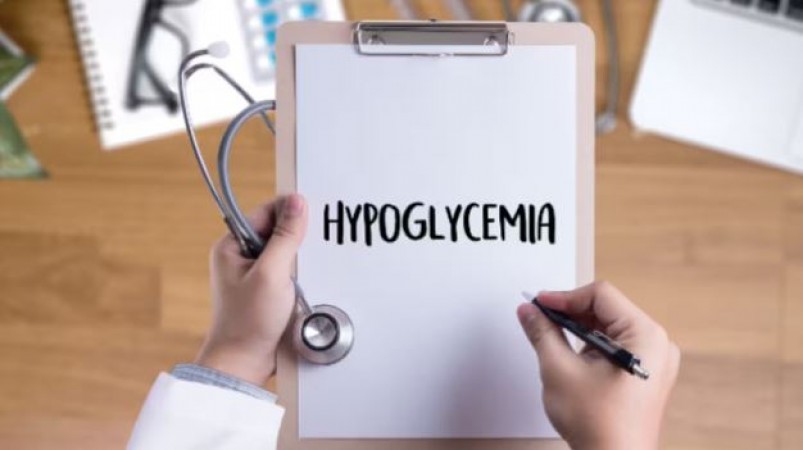
Diabetes is a chronic medical condition primarily caused by poor lifestyle choices. If left (How to Manage Hypoglycemia) unmanaged for an extended period, it can have severe effects on various body organs. In some cases, diabetic individuals may even slip into a coma due to extremely high or low blood glucose levels. When blood glucose levels drop significantly, it leads to a condition known as hypoglycemia. Hypoglycemia occurs when there is too little glucose in the body, and glucose is the primary source of energy for our cells. This condition manifests through various symptoms, and it's crucial to recognize and address them (How to Manage Hypoglycemia) promptly.
Symptoms of Low Blood Glucose Levels (Hypoglycemia):
Rapid Heartbeat: A sudden increase in heart rate is a common sign of low blood glucose levels.
Pale Skin: Hypoglycemia can cause the skin to become pale or even develop a bluish tint.
Irritability: Individuals may become irritable, anxious, or agitated when experiencing hypoglycemia.
Confusion: Hypoglycemia can lead to confusion, difficulty concentrating, and cognitive impairment.
Unconsciousness: Severe hypoglycemia can result in loss of consciousness.
Fatigue: Individuals may feel unusually tired or fatigued during a hypoglycemic episode.
Excessive Sweating: Profuse sweating, even in cool conditions, is a common symptom.
Hunger: Sudden and intense hunger can be a sign of low blood glucose levels.
Dizziness or Lightheadedness: People may experience dizziness or a sense of light-headedness.
Blurred Vision: Vision may become blurry, making it difficult to see or focus.
Nausea: Nausea and sometimes vomiting can occur with hypoglycemia.
Shakiness or Tremors: Muscle tremors or shakiness may be noticeable.
Incoherence: Individuals may have difficulty speaking coherently.
Weakness: Weakness and a lack of energy are common during hypoglycemia.
Anxiety: Feelings of unease or anxiety can be prominent.
Fainting: In severe cases, hypoglycemia can lead to fainting spells.
Managing Hypoglycemia:
When someone experiences symptoms of hypoglycemia, it's crucial to act quickly to raise their blood glucose levels. This can typically be achieved by consuming fast-acting carbohydrates. Here are some options:
Glucose Tablets: These are specifically designed to raise blood glucose levels quickly.
Fruit Juice: A small glass of fruit juice, which contains natural sugars, can be effective.
Honey: A teaspoon of honey can provide a quick source of glucose.
Jelly Beans: A small number of jelly beans can be consumed to increase blood sugar.
Gumdrops: Like jelly beans, gumdrops are a sugary option to counter hypoglycemia.
In severe cases of hypoglycemia where the individual is unconscious or unable to consume oral glucose, glucagon injections may be necessary. Glucagon is a hormone that raises blood glucose levels by stimulating the release of glucose from the liver.
People at Risk of Hypoglycemia:
Hypoglycemia is more likely to occur in certain individuals, including:
Those with Diabetes: People with diabetes, especially those taking insulin or certain oral medications, are at higher risk.
Heavy Alcohol Drinkers: Excessive alcohol consumption can lead to hypoglycemia, particularly in individuals with diabetes.
Pancreatic Tumor Patients: Tumors affecting the pancreas can disrupt insulin production, increasing the risk of hypoglycemia.
Individuals with Severe Illness: Serious illnesses can affect the body's ability to regulate blood sugar.
Prolonged Diabetes Patients: Individuals who have had diabetes for many years may become more susceptible to hypoglycemia.
Elderly Individuals: People aged 60 and older may be at greater risk due to age-related changes in glucose metabolism.
Recognizing the Symptoms of Hypoglycemia:
It's essential for individuals with diabetes, their caregivers, and healthcare professionals to recognize the symptoms of hypoglycemia promptly. Early intervention can prevent severe complications and potentially life-threatening situations, such as a diabetic coma.
Symptoms indicating a significant drop in blood glucose levels include:
Confusion or altered mental state
Loss of consciousness
Seizures
Inability to eat or drink due to altered consciousness
Profound weakness or inability to move
In cases where severe hypoglycemia results in loss of consciousness or seizures, immediate medical attention is crucial. Glucagon injections may be administered, or intravenous (IV) glucose may be given to raise blood sugar levels rapidly.
Preventing Hypoglycemia:
Preventing hypoglycemia is a key aspect of diabetes management. Here are some strategies to help reduce the risk of low blood glucose levels:
Regular Monitoring: Regularly monitor blood glucose levels using a glucose meter to catch any fluctuations early.
Balanced Diet: Maintain a balanced diet with a focus on complex carbohydrates, fiber, and lean proteins to help stabilize blood sugar levels.
Medication Management: If you're taking diabetes medications, follow your healthcare provider's instructions carefully and be mindful of the timing and dosage.
Meal Planning: Plan meals and snacks at consistent times to avoid long gaps between eating.
Alcohol Moderation: If you consume alcohol, do so in moderation and ensure you have food with it to prevent hypoglycemia.
Physical Activity: Incorporate regular exercise into your routine but be cautious to avoid exercising when your blood glucose levels are too low.
Medication Adjustments: Work closely with your healthcare provider to adjust medications as needed, especially if you experience frequent episodes of hypoglycemia.
In conclusion, hypoglycemia is a critical concern for (How to Manage Hypoglycemia) individuals with diabetes and certain other medical conditions. Recognizing the symptoms and taking prompt action to raise blood glucose levels can prevent complications and ensure the individual's safety. Effective management of diabetes through lifestyle changes, medication, and regular monitoring is key to reducing the risk of hypoglycemia and its potentially serious consequences.
How to Look and Feel Your Best as You Age: Top 10 Skincare Tips for Mature Skin
Dietary Guidelines for Kidney and Dialysis Patients to Find Relief
Be careful if you eat too much sweets! Old age will come before time, losses will be serious